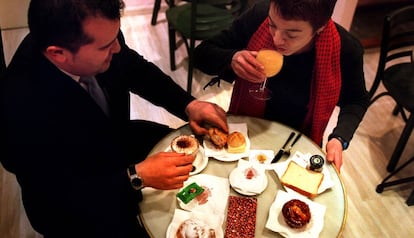Catalonia region introduces “soda tax” on sugary drinks
Manufacturers complain they are being unfairly singled out by levy, which will boost prices by around 7%

A new tax on sugar-laden sodas and other drinks went into effect in Catalonia on Monday, meaning that consumers will have to pay more for a wide range of products, such as flavored water, energy drinks and fruit juices made from concentrate. The amount of tax varies according to the sugar content of the drink. For example, a 330ml can of Coca-Cola that could be bought in a local supermarket for €0.58 yesterday now costs €0.62, a 7% hike.

In big Spanish supermarkets such as OpenCor and Mercadona, the price hike was announced several days ago, but some consumers have complained that they were not warned the tax would also affect chocolate drinks, sports drinks or cold tea and coffee drinks.
A can of Coca-Cola that could be bought for €0.58 now costs €0.62, a 7% hike
“I believe there has been a lack of information,” said Enric Ribas, a supermarket customer in the center of Barcelona.
The Catalan regional government’s levy means that the price of drinks with between five and eight grams of sugar for every 100 milliliters will rise by €0.08 per liter and the price of drinks with more than eight grams of sugar for every 100 milliliter will rise by €0.12.
While the tax could raise more than €41 million a year for government coffers, the main objective is said to be aimed at improving public health by reducing sugar consumption according to the World Health Organization (WHO) recommendations, which are already followed by countries such as France and Denmark.
The idea of taxing sugary soft drinks has been debated for more than a decade by public health authorities, and Mexico, which has been hit by an obesity epidemic, was among the pioneers.
While the tax could raise more than €41m a year, the main objective is to improve public health
But the Soft Drinks Association in Spain (Anfabra) says the sector feels discriminated against as other products such as baked goods also contain a good deal of added sugars.
Meanwhile, the Association of Manufacturing Companies and Distributors (AECOC) calculates that the tax will mean the value of sugary soft drinks will rise between 8% and 50%. Those most affected will be supermarkets’ own brands. Distributors such as bars, stores and supermarkets, will indicate what will be known as the IBEE tax on the receipt.
Spain’s central government has in the past tried to incorporate such a tax into the budget only to backtrack at the last minute. In Catalonia, a previous attempt to introduce the levy by the former economy chief, Andreu Mas-Collel, was foiled in 2013 when US ambassador Alan D. Solomont warned the decision would affect American investment in the region.
Natural fruit juices, alcoholic beverages and alternatives to milk with no added sugar, as well as products with medical benefits, are exempt from the tax. Sugar-free soft drinks such as Coca-Cola Zero also get off scot-free.
English version by Heather Galloway.
Tu suscripción se está usando en otro dispositivo
¿Quieres añadir otro usuario a tu suscripción?
Si continúas leyendo en este dispositivo, no se podrá leer en el otro.
FlechaTu suscripción se está usando en otro dispositivo y solo puedes acceder a EL PAÍS desde un dispositivo a la vez.
Si quieres compartir tu cuenta, cambia tu suscripción a la modalidad Premium, así podrás añadir otro usuario. Cada uno accederá con su propia cuenta de email, lo que os permitirá personalizar vuestra experiencia en EL PAÍS.
¿Tienes una suscripción de empresa? Accede aquí para contratar más cuentas.
En el caso de no saber quién está usando tu cuenta, te recomendamos cambiar tu contraseña aquí.
Si decides continuar compartiendo tu cuenta, este mensaje se mostrará en tu dispositivo y en el de la otra persona que está usando tu cuenta de forma indefinida, afectando a tu experiencia de lectura. Puedes consultar aquí los términos y condiciones de la suscripción digital.








































